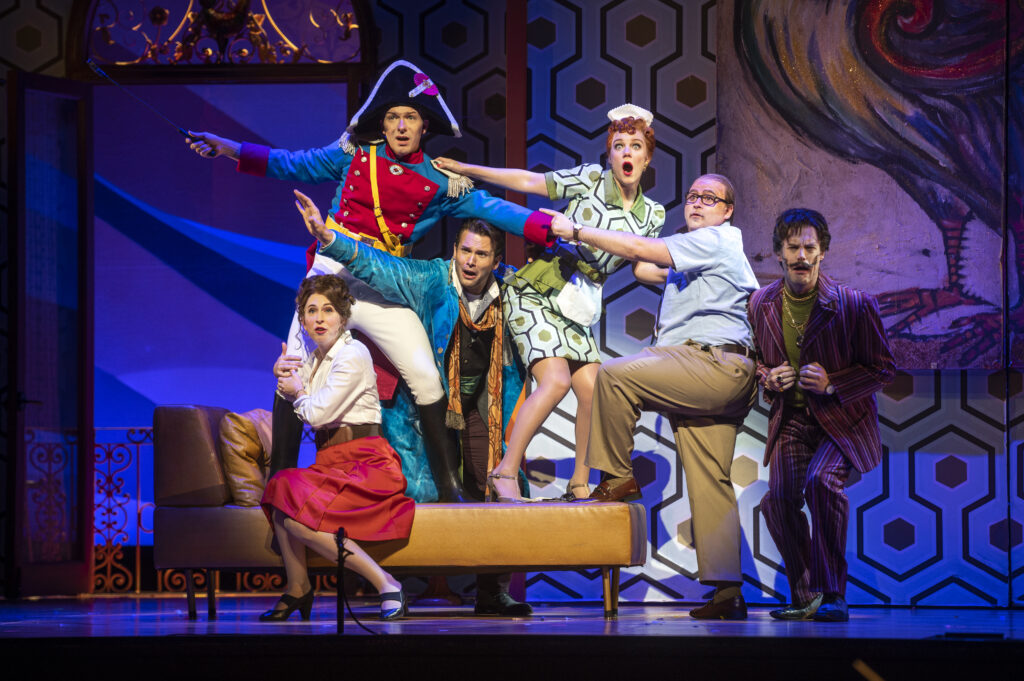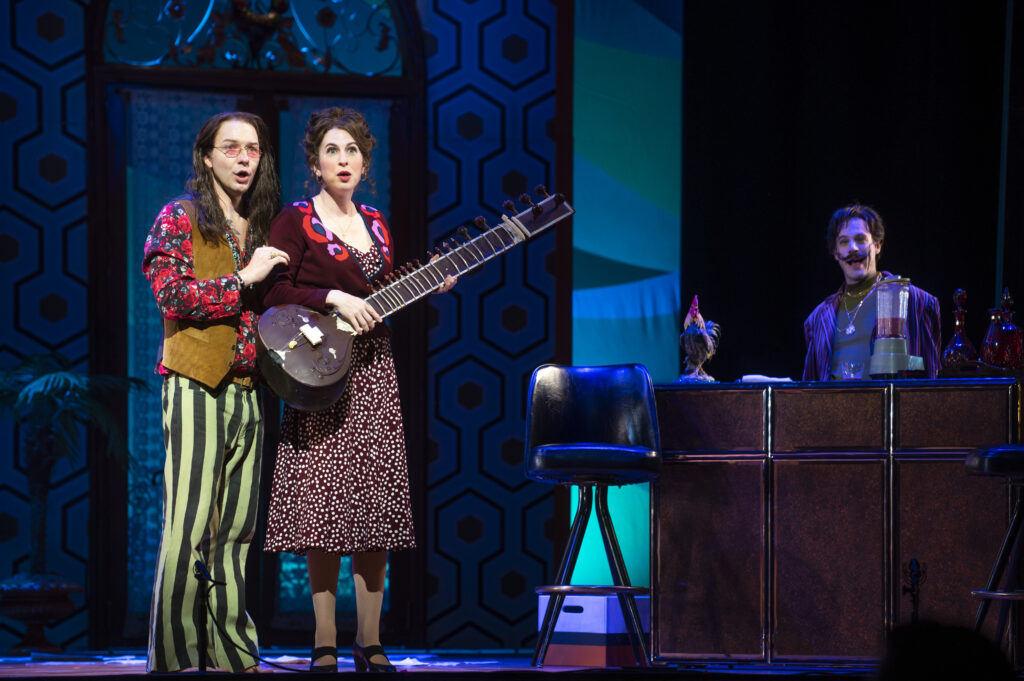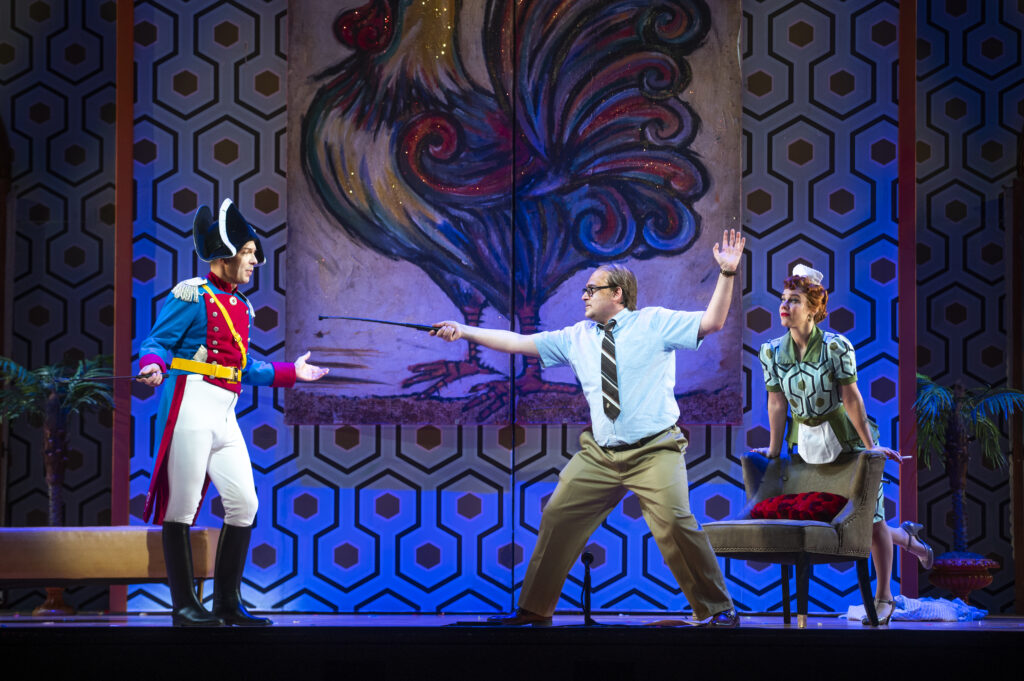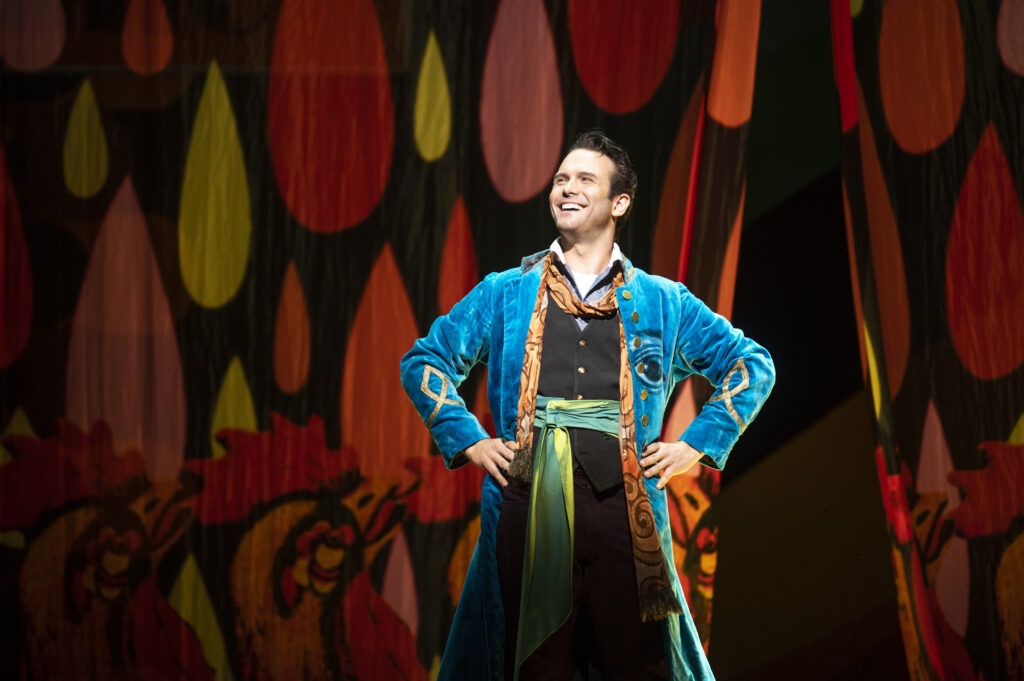Last Saturday night the Atlanta Opera unveiled the third stage production of its 2021-22 season, the company’s comeback season following the prolonged pandemic-related hiatus, with a performance of Rossini’s comic masterpiece, Il barbiere di Siviglia. Though pandemic statistics in our city and state continue to trend favorably, safety for staff and patrons remains a prime focus with the Atlanta Opera, and as it was at the time of the season’s opener last November (Handel’s Giulio Cesare,) proof of vaccination or a negative antigen test are still required to enter the Cobb Energy Center. Inside the hall mask mandates have been lifted, though their use is still highly encouraged. In practice, the majority of the opening night audience sported them inside the auditorium and during intermission. An update of the company’s policy is broadcast prior to the curtain by a public health official, and a curious sense of community is impressed upon many by the reminder that it is not only the audience that risks much in attending these performances, but also the musicians and artists who have made them possible. After the tremendous stress of the past two years, complying for the general safety of all in order to bask in the glory of a treasured comedy and have a much-needed laugh seemed like an easy ask.

It has been remarked that it is easier to make an audience cry than to make them laugh, and though the musical virtues of the operas of the buffa genre virtually guarantee their position in the standard repertoire, they often land short of achieving their intended effect. Italian comedy of this period can strike modern audiences as slap stick, campy and grotesquely overstated. To ensure success, director Michael Shell has cleverly refashioned Rossini’s masterpiece through a definite mid-20th century Spanish sensibility evocative of the work of Pedro Almodovar. Taking as evidence the quotes presented in the production playbill and the director’s notes from the production’s 2014 unveiling at Opera Philadelphia, the production team’s intention to emulate the aesthetic of the famed Spanish film director is transparent. Shoko Kambara’s set design is dominated by aggressive pop art elements realized through an Iberian color palette and are often juxtaposed by anachronistic costumes by Amanda Seymour. The resulting atmosphere is cohesively Spanish and primed for the ridiculous. All that’s needed is a cast on the verge of a nervous breakdown and stir.
Called upon to do just that, Carl & Sally Gable Music Director Arthur Fagen managed the principals and the forces of the Atlanta Opera Orchestra and Chorus with a tidy baton: and this was no simple task. Bel Canto opera has a bad reputation for featuring basic orchestrations, but Rossini infamously tagged “il Tedeschino” early in his career, and Il barbiere di Siviglia’s orchestration is among his most descriptive, instigating the stage proceedings in very palpable ways: It gesticulates, comments and reacts. Once he had shaken off the opening night jitters (the reading of the famous overture was initially tentative,) Maestro Fagen managed to synergize the forces in the pit and stage without reducing his contribution to that of a traffic control cop: much of what was heard on opening night was realized with verve and glittery brilliance. A favorite with Atlanta audiences for over 15 years, his leadership was supportive and considerate, keeping the performance on its rails whenever the ride got shaky and creating musical space for those in need.

This was a position that the evening’s Figaro, the opera’s title character played by baritone Joseph Lattanzi, unfortunately found himself in. A rewarding assignment for those who fit the bill, Rossini’s Figaro will mercilessly call out those who don’t, and the ultimate litmus test is administered at the character’s very entrance: the iconic Largo al factotum. The showpiece permits the baritone to showcase the character’s personality through exuberant vocal means. As heard on opening night, Mr. Lattanzi possesses an attractive baritone of respectable dimension, but it does not roar with Spanish bravado or thrive in the flurry of patter singing sequences to qualify his efforts a success. The testing leaps to the high G called out a certain disconnect between the middle and upper tessitura. The scene was rendered passable through Mr. Lattanzi’s winning stage presence and stage business, and to his credit, the rest of the evening found him settling more comfortably into his paces. While the qualities that make a Figaro vocally memorable were simply not within his grasp last Saturday, his is certainly not a “bad voice”, and many of his long-held utterances towards the end of the evening provided evidence of an instrument which could graciously serve many of the famous Mozart baritone parts and someday graduate to more serious bel canto assignments. He remains an artist within our radar.
To the surprise of many, Figaro’s patron and partner in crime, the Count Almaviva, was not portrayed in these performances by Atlanta Opera discovery Santiago Ballerini, but by Taylor Stayton making his Atlanta Opera debut with these performances. A veteran of the role, Mr. Stayton provided evidence of his worth through the impressive fluidity in his scale up to the upper middle during the first act’s serenade scena. The inescapable comparisons to Mr. Ballerini ultimately qualified Mr. Stayton worthy of the assignment: His is a gallant, soft grained lyric tenor graced by a pale timbre which can fill the house with ease until challenged by either orchestra or colleague. A certain tightness in the ascension to the upper extension of his scale was also a deterrent, and his vocalism lacks an incisive edge, making the exclusion of the extracurricular “Cessa piu non resistere” bravura showpiece (which recent performance tend to reinsert into the opera) a wise choice. As a physical actor, he commanded the stage, demanding the attention of the audience at his every involvement, particularly in his portrayal of Don Alonso, realized in this production as a peace-loving, yoga practicing hippie by Mr. Shell.

The role of Rosina has run the gamut of casting practices through the history of the part, and though premiered by a contralto, the alternate tradition of the soprano Rosina was started by the composer himself. The 19th century Italian opera scene was a wild place, and it was not uncommon for composers to churn out transposed versions of their own work for famous artists of the day. For these performances of Il barbiere di Siviglia, the Atlanta opera celebrates Rossini’s original conception by entrusting the part to a lower voice. Making her Atlanta Opera debut as the feisty Spaniard, mezzo soprano Stephanie Lauricella, fulfills the vocal demands of the role with flying colors. Her instrument is of lyric weight and exceptionally limber, allowing its mistress to accomplish the score’s florid complications with apparent ease. Though the lower register is not dominant, it is certainly securely placed and within the singer’s control: if allowed to develop, it promises to bring added excitement to her future portrayals. Her success, however, was not complete. Though the voice satisfies the athletic demands, her declamation and timbre were ill-matched to the character’s piquant personality, and theatrically she tended to yield the spotlight to her zany colleagues. While these held back her transformation into the endearing feisty queen of hearts we expect to greet us by the final curtain, we hope to continue to witness her development in future Atlanta Opera seasons.
Saturday night’s opening night performance will be referenced to future opera goers as the United States and Atlanta Opera debut of bass-baritone Giovanni Romeo, entrusted here with the role of Doctor Bartolo. For all intents and purposes, the night belonged to him. Vocally, his instrument is malleable and responsive in loud, soft and ornate passages. Wielded by Mr. Romeo, this voice can both bloom beautifully and distort itself to express the passions of the ridiculous assignment. His aria “A un dottor de la mia sorte” does not enjoying the same fame as other numbers in the opera, but can prove particularly testing in its mix of sustained singing, legato, and patter outbursts, which Mr. Romeo executed with expert measure and comedic verve. Dramatically, he is a scene stealer like Mr. Stayton, though he achieved this through subtler means: A slight change in position, or a well-time silence allowed him to redirected the spotlight to himself at every turn. This is not to say that he was above the more overt antics, for he was able to successfully land the interpolated side business of doctor Bartolo’s split persona as a rooster for the entirety of the show. There was even a rooster ballet which accompanied the tempest interlude in act two and it was entirely hilarious! In the hands of Mr. Romeo, his Bartolo was ultimately realized pedantic and pathetic through a Falstaffian reading. It elevated the character well beyond the stock figure treatment we are often accustomed to and inspired disappointment in many when Doctor Bartolo doesn’t end up with the girl at the end.

Going past this benchmark, bass-baritone David Crawford’s portrayal of Don Basilio was vigorously overstated. Think The Joker played by John Travolta, add excess. The voice itself remains his best calling card, and though not the most idiomatic for this sort of music, his instrument projected firmly though the paces of the famous “La calumnia”. In a refreshing bit of casting, the role of Berta was reimagined as a young sexy maid, allowing soprano Cadie J. Bryan to steal a bit of the scene in her various comings and goings. She also surprised the ear by offering her fresh, pleasing soprano to Berta’s often ignored aria di sorbetto (literally, the song you want to leave the auditorium during to use the facilities or get some ice cream). Baritone Sankara Harouna started the night on a positive tone as Fiorello, and company favorite Mitch Gindlesperger offered his seasoned bass-baritone through a sturdy take of the police officer during the finale of the first act. The hilarious David Silverstein as Ambrogio rounded out the cast by shuffling his way through a night of great music making and so many giggles.
Two more performances remain in the Atlanta Opera’s run of Rossini’s Il barbiere di Siviglia. For ticket information, details of the company’s exciting 2022-23 season, or to learn more about the company, please visit its website at www.atlantaopera.org
-Daniel Vasquez